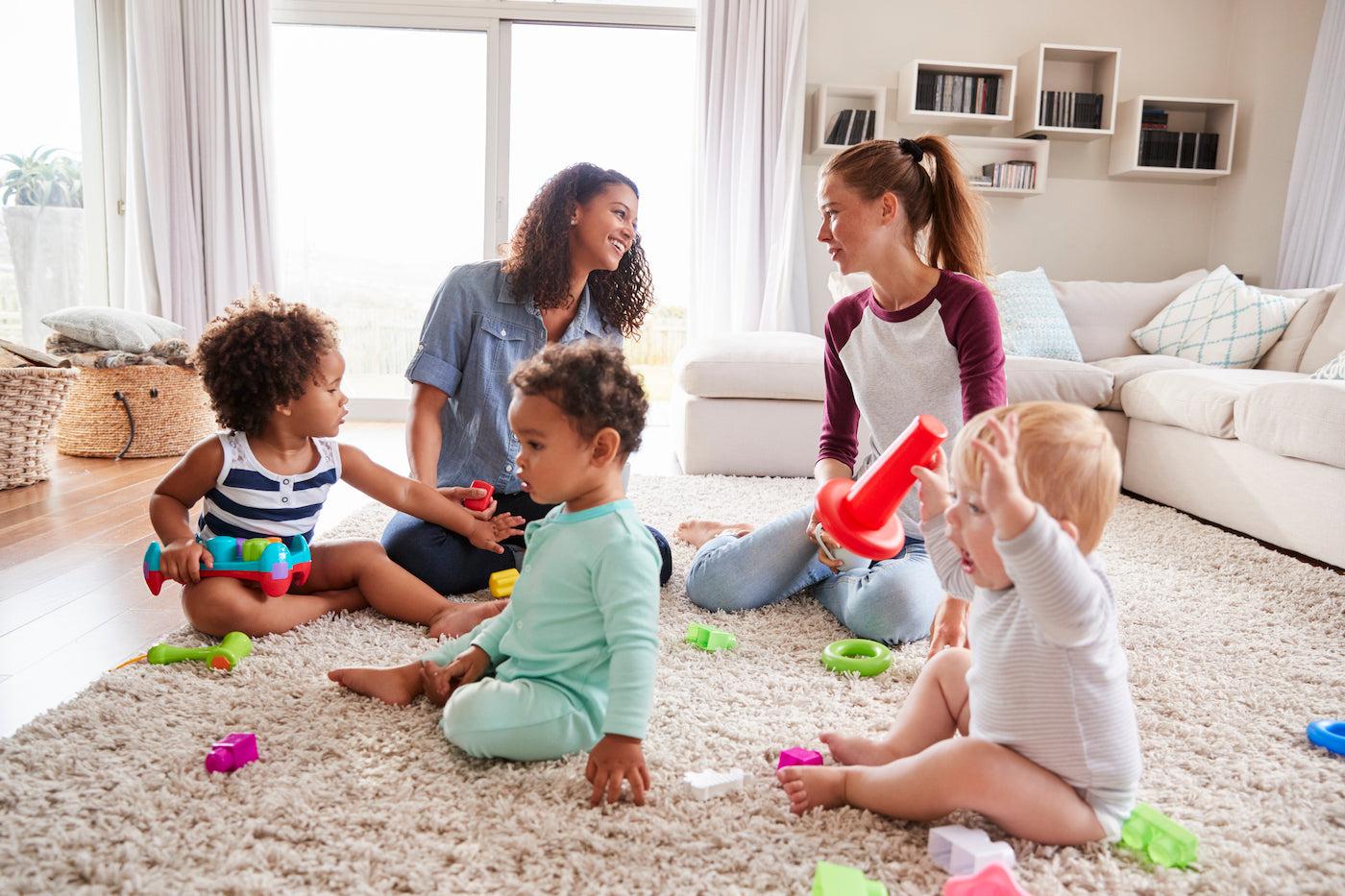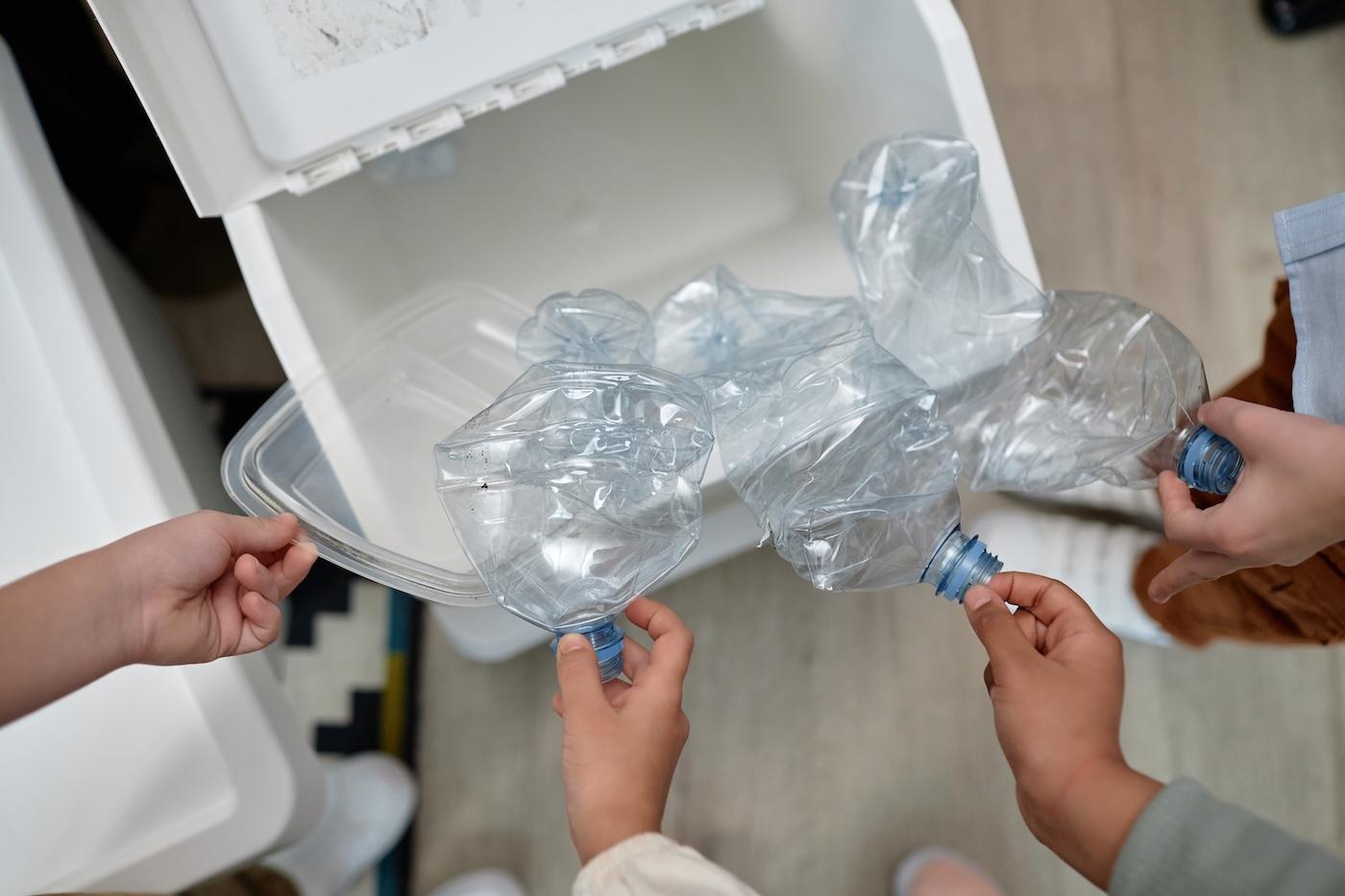PARENTS
10 Playdate Pro Tips for First-Time Parents
Embarking on playdates can be intimidating! This advice will make it easier.

Written by
Jenny Studenroth Gerson

Getting together with other families with young children is important for both you and your bub. You get to make parent pals who can become great sounding boards and confidants (or even provide in-a-pinch childcare!). Meanwhile, your little one—no matter how young—has so much to gain from spending time in the presence of other children. Simply observing faces as babies or engaging in parallel play as toddlers allows kiddos to grow in leaps and bounds.
But in order to foster those valuable friendships, you have to take a leap into the world of playdates. (Gulp!) True, playdates require a little more coordination than a grownups-only meetup…and a dash of courage, too. But, as intimidating or confounding as it can be to embark on your first playdates, we promise, once you dive in, there’s lots of fun to be had. To make it easier, peep our top playdate tips.
Connect and follow through.
The first step in planning playdates as a first-time parent is to find other families to meet up with! This is one of those parenting plunges we all have to take…so inhale deeply and try to set your anxieties aside! It gets easier (promise!).
If you live in a neighborhood filled with other young families, make the effort to hang out with your child(ren) in areas or at times of day when you’re likely to run into other parents. This could be an evening walk or even a mailbox run!
Parks, shops, and public pools or splash pads are other good places to meet fellow parents. Strike up a conversation and see how it flows (a simple “hi!” is a good place to start). Once you’ve started chatting, don’t be embarrassed to ask for their contact details; chances are they’re open to new friendships as well.
A third option is using technology. Join local parenting groups on Facebook and try the Peanut App (which is like a dating app for moms and dads!). These are great ways to connect with other parents with whom you share interests and similarly aged children.
The most important element of kicking off a playdate friendship is to actually follow through on your casual mention to meet up. Get in touch soon after meeting before everyone forgets and life moves on. Suggest hanging out and give a few date and time options upfront to make it clear you really do intend to see them soon and make time to do so.
Schedule playdates wisely.
Sometimes we go overboard in an attempt to please others and end up scheduling too much in in a short period of time. Make sure when you send your availability or review theirs, that you aren’t eclipsing your own needs for exercise, nap time, etc. You’re a lot less likely to panic and cancel at the last minute if the playdate is scheduled for a day and time that fits effortlessly into your routine.
Set a playdate end point.
Once you get to know someone well and the kids love playing together, a bit of natural flow will emerge in your time spent together. But in the early days when play-dating with a new family really does feel like courting, it puts a lot less pressure on everyone to keep the meetups to an hour or so, and to state as much upfront. It’s absolutely not rude to say something like, “We can meet you on Wednesday at 2:45, and we’ll have to get going at 4. Looking forward to it!” Nor to state upon your arrival, “We need to head out at 4, but I’m so glad we were able to find time to meet up!”
If the vibe is good and the conversation is easy, you’ll likely book a bit more time for your next play date, but this way everyone has a built-in escape if things just aren’t a good fit and/or you truly do have somewhere else you need to be afterward.
Plan your playdate on neutral ground.
First playdates often work out best when they happen in public. This allows one party to show up early or hang later if they know their child wants more time to play, and it removes any pressure to clean up in advance or prepare snacks and activities.
Parks, playgrounds, easy hiking trails, and open fields are all wonderful options that will allow the kids to play, run around, and connect while parents chat nearby. If the weather is iffy, an indoor play gym or even a coffee shop are perfect alternatives. If meeting at a coffee shop or restaurant, pick one that has yummy options for kids and bring coloring books for everyone to make it easier on both parents and allow you a chance to chat.
Host playdates when you’re ready.
Once a connection has been made, offer to have them over. In order for hosting to go smoothly, make sure your child’s favorite toys that they will have a hard time sharing are put up in their bedroom or another space where they won’t cause conflict.
Don’t go crazy cleaning up or making beautiful refreshments. Canned seltzers or a pot of coffee is sufficient for Mom or Dad, and a simple snack like fruit or cheese and crackers will be perfect for the kids. Host at a between-meals time when you won’t feel pressured to serve lunch, at least while you’re still getting to know each other.
Consider a low-key playdate activity.
Whether at your home or a neutral place, it always helps to plan something in advance for the kids to do so there’s no awkwardness. For example, if you’re meeting up in an open green space, bring a ball they can kick around or bubbles to blow.
If you’re hosting, print out free coloring sheets ahead of the playdate or set up a simple sensory station outside in warm weather so they can have fun together without having to come up with an elaborate game off the bat. Remember, kids feel jittery when hanging out with new people just like we do; a shared experience that you’ve planned ahead will help calm those nerves for everyone.
Bring a little something to your playdate.
If the other family is hosting, it can’t hurt to go old-school and offer a little token upon arrival. This can be anything from a treat to serve the kids during the playdate to flowers for the kitchen. Whether this turns into a lifelong friendship or not, a small, kind gesture is always appreciated and is the type of thing that shows that you care.
Handle playdate hiccups calmly.
From babies having blowouts to toddler tantrums and preschoolers fighting, life with kids is never predictable and rarely seamless. If something awkward, negative, or embarrassing happens during the playdate, be gentle on yourself and remember everyone has flaws and problems.
Chances are, the other parent has been there and understands. And if it’s a matter of your child and theirs having a disagreement, this is no way means there can’t be a second playdate with a better outcome. Just be kind to yourself, patient with the kids, and try not to worry too much about it. Following up post-playdate with a funny text about whatever went wrong shows you are laid back and don’t sweat the small stuff. This is a very welcome trait in friends, especially when everyone has young children.
And remember, if the other parent isn’t able to get past your toddler’s tantrum or acts like they’ve never spilled a sippy cup’s worth of apple juice on a coffee shop floor, then it’s best you learned early that they aren’t for you. There are plenty of other mommy- and daddy-fish in the sea!
Keep the playdate momentum going.
If things go well on a first playdate, go ahead and suggest #2 right away. Sometimes saying “Let’s do this again soon” can fill us with nerves, but sending a text later on that day or later in the week works too. Just make sure too much time doesn’t pass before you reach out, even just to say “hi.”
When everyone has packed schedules, frequent playdates aren’t always possible. But keeping in touch and making it clear that you want to see them again, can lead to sporadic meetups in the months ahead — and long-term friendships that grow and deepen for years to come.
Don’t give up!
Know going into the playdate scene that not every family you try out will be the best fit. Some kids and parents just don’t mesh well, and that’s okay. Don’t lose heart if the first few connections don’t lead to much. The point is getting out of the house and socializing your child. And having adult conversations with other parents who are in the same stage of life as you.
Just like when you were dating and even a bad date meant that you had eaten dinner outside of the home and tried something new, no playdate is a waste of time. You tired out your child, you cleaned up your playroom, you put on pants! These are wins. And as far as lasting connections go, even if only one out of every handful of parents you meet ends up becoming a good friend, that will be worth the effort when you’re all in the next stages of parenting together.
Embarking on friendships with fellow parents might seem intimidating or unattainable now, but they will be some of the most important relationships you’ll ever have. Dive in and keep trying; you’ll be so glad you did.
More on Play:
- 3 Types of Play Toddlers Need Every Day
- How to Encourage Independent Play
- Toddler Playroom Ideas
- How Kids Learn How to Play
- Why Blocks Are the Ultimate Baby and Toddler Toy
Disclaimer: The information on our site is NOT medical advice for any specific person or condition. It is only meant as general information. If you have any medical questions and concerns about your child or yourself, please contact your health provider.
SHARE THIS ARTICLE
MOST LOVED
Sleepytime Sidekicks












